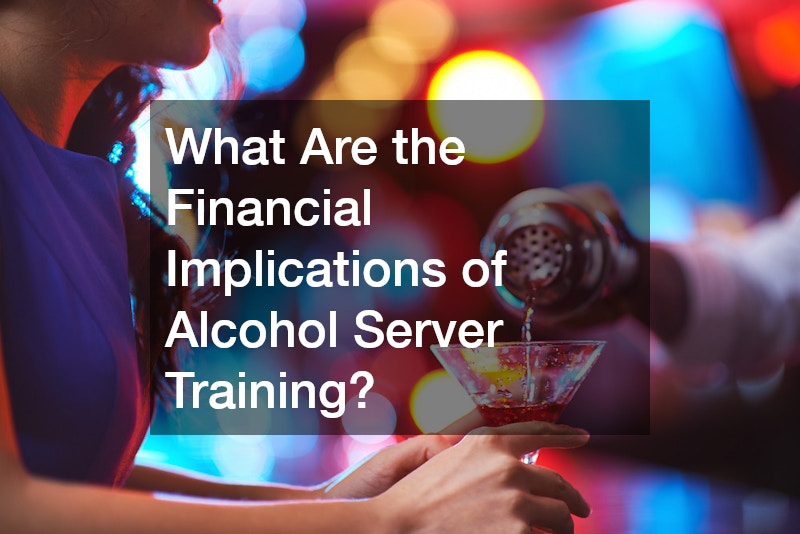Introducing the concept of alcohol server training and its importance in the restaurant industry, it becomes increasingly evident that comprehensive training is crucial for any establishment serving alcoholic beverages. Alcohol server training equips employees with essential knowledge and skills that ensure responsible service, protect the establishment from legal issues, and enhance overall customer satisfaction. Understanding the multifaceted benefits of such training programs is vital for restaurant owners aiming to optimize their business operations and success.
What is Alcohol Server Training?
Alcohol server training encompasses various components vital to managing and serving alcoholic beverages. It includes understanding the legal requirements of serving alcohol, which vary by state and country but generally encompass age verification and responsible sale practices.
Additionally, server training focuses on responsible serving techniques that prevent overconsumption and ensure the safety of both patrons and the community. Interacting with customers and educating them on responsible consumption while maintaining a friendly demeanor are also significant components of this training.
Without proper training, servers might inadvertently contribute to scenarios that involve legal ramifications and customer dissatisfaction. Many programs include role-playing scenarios, ensuring servers can handle difficult situations calmly and professionally. By incorporating a thorough education on legal obligations and best serving practices, such training significantly reduces the risks associated with alcohol service in restaurants.
Alcohol server training is not just about compliance; it’s about offering better service and enhancing the guest experience. This training often introduces new serving protocols that align with contemporary customer service strategies. Restaurants with trained alcohol servers report fewer incidents of customer intoxication and related disruptions. Accordingly, embedding these educational components into server training ensures that employees are well-prepared to consider the legal and social responsibilities accompanying alcohol service.
Why is Alcohol Server Training Essential for Restaurants?
Responsible alcohol server training is fundamental for restaurant operations as it significantly increases customer safety and satisfaction. The benefits extend beyond mere compliance, positively impacting the overall dining experience and organizational reputation. By enforcing responsible serving practices, restaurants can cultivate a safer and more enjoyable environment for all patrons.
Aside from ensuring customer safety, establishments with trained staff members often see enhancements in their public image and customer relations. Seeing proactive measures in place reassures patrons of the restaurant’s commitment to their well-being. Thus, these benefits foster customer loyalty, increase returning customer rates, and improve word-of-mouth recommendations.
The preventive measures associated with alcohol server training also ward off potential legal issues, which can be severely detrimental to businesses. Through education and responsible practices, staff members can recognize signs of intoxication and manage customer interactions effectively. Establishing a robust training program invests in sustainable growth and operational stability, aligning the business for immediate and long-term gains.
How Can Server Training Improve Your Restaurant’s Reputation?
The primary influence of alcohol server training on a restaurant’s reputation is manifested through improved customer experiences. Well-trained servers are more adept at reading customer cues and catering to patrons’ needs proficiently without compromising responsible serving standards. This heightened attention to detail is pivotal in leaving a lasting positive impression on guests, promoting repeat visits.
Moreover, a well-executed alcohol server training program assures clientele of the restaurant’s integrity and commitment to safety, ultimately elevating customer trust and satisfaction. It ensures that servers are consistent in their approach, adjusting their service to accommodate customer preferences and safety protocols. This professionalism contributes to acquiring favorable reviews and enhancing overall public perception.
Focusing on customer experience through proper training strengthens the restaurant’s reputation and cultivates a loyal customer base. Happy patrons are likelier to leave positive feedback and recommend the establishment to others. Consequently, this favorable reputation is an invaluable marketing asset, drawing new customers and increasing the restaurant’s competitive edge in the industry.
What Are the Financial Implications of Alcohol Server Training?

Conducting a cost-benefit analysis of alcohol server training programs reveals that long-term financial gains justify the initial investment. While immediate costs are associated with developing and implementing these programs, they effectively diminish liabilities associated with irresponsible alcohol service. These reductions in liability can save restaurants considerably in potential legal fees and penalties.
Moreover, the financial implications extend beyond risk mitigation, as training improves service quality and sales performance. Educated servers who understand the nuances of responsible alcohol service can effectively upsell products, increasing the average order value and overall sales. Such improvements often surpass the costs involuntarily absorbed at the beginning stages of training implementation.
As patrons recognize and appreciate the diligent service and safety measures, restaurants experience increased patronage and higher customer retention rates. Consequently, these aspects create a more stable revenue stream and contribute to the restaurant’s profitability. The return on investment for alcohol server training is evident in diminished risks and appreciable enhancement in the business’s overall financial health.
Alcohol server training is a critical component for any restaurant seeking to optimize its operations and enhance customer satisfaction. This training is invaluable in improving service professionalism and safeguards against potential legal issues, which are essential in maintaining a positive business reputation. By leveraging the advantages of alcohol server training, restaurants can significantly boost their business performance while also promoting a safe and enjoyable environment for all guests.





